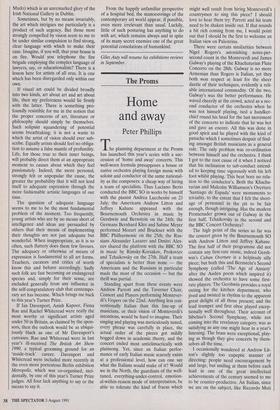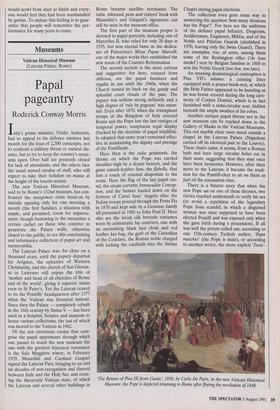The Proms
Home and away
Peter Phillips
The planning department at the Proms has launched this year's series with a suc- cession of 'home and away' concerts. This well-worn formula presupposes a house or native orchestra playing foreign music with soloist and conductor of the same national- ity as the composers: a cheap way of hiring a team of specialists. Thus Luciano Berio conducted the BBC SO in works by himself with the pianist Andrea Lucchesini on 23 July; the Americans Andrew Litton and Jeffrey Kahane appeared with the Bournemouth Orchestra in music by Gershwin and Bernstein on the 24th; the Germans Bernhard Klee and Sabine Meyer performed Mozart and Bruckner with the BBC Philharmonic on the 25th; the Rus- sians Alexander Lazarev and Dmitri Alex- eev shared the platform with the BBC SO in music by Rimsky-Korsakov, Prokoviev and Tchaikovsky on the 27th. Half a team of specialists is better than none — the Americans and the Russians in particular made the most of the occasion — but the thrill was partial.
Standing apart from these events were Andrew Parrott and the Taverner Choir, Consort and Players performing Montever- di's Vespers on the 22nd. Anything less con- ventionally Italian than this line-up of musicians, or their vision of Monteverdi's intentions, would be hard to imagine. Their singing and playing was meticulously tuned, every phrase was carefully in place, the actual order of the pieces got mildly bogged down in academic theory, and the concert ended most anticlimactically with plainsong. Yet, since an Italian perfor- mance of early Italian music scarcely exists at a professional level, how can one say what the Italians would make of it? Would we in the North, the guardians of the well- tuned, everything-under-control, emotion- al-within-reason mode of interpretation, be able to tolerate the kind of fracas which
might well result from hiring Monteverdi's countrymen to sing this piece? I should love to hear them try: Parrott and his team need to be shaken inside out. If that sounds a bit rich coming from me, I would point out that I should be the first to welcome an Italian view on Palestrina.
There were certain similarities between Nigel Rogers's astonishing notes-per- second count in the Monteverdi and James Galway's playing of the Khachaturian Flute Concerto on the 28th. Galway is no more Armenian than Rogers is Italian, yet they both won respect at least for the sheer dazzle of their techniques, evidently a reli- able international commodity. Of the two, Galway's was the better performance. He waved cheerily at the crowd, acted as a sec- ond conductor of the orchestra when he was not himself playing, tied a handker- chief round his head for the last movement of the concerto to indicate that he was hot and gave an encore. All this was done in good spirit and he played with the kind of panache which I sometimes despair of find- ing amongst British musicians as a general rule. The only problem was co-ordination between himself and the orchestra. I think I got to the root cause of it when I noticed that his inclination to sub-conduct extend- ed to keeping time vigorously with his left foot whilst playing. This beat bore no rela- tion to the conductor's. Both the Khacha- turian and Malcolm Williamson's Overture `Santiago de Espada' were monuments to triviality, to the extent that I felt the short- age of personnel in the pit to be fair enough, though intriguing. Has the modern Promenader grown out of Galway in the first half, Tchaikovsky in the second and the BBC Concert Orchestra?
The high point of the series so far was the concert given by the Bournemouth SO with Andrew Litton and Jeffrey Kahane. The first half of their programme did not contain any first-rate music, indeed Gersh- win's Cuban Overture is a helplessly silly piece; but both this and Bernstein's Second Symphony (called 'The Age of Anxiety' after the Auden poem which inspired it) showed the orchestra to have some first- rate players. The Gershwin provides a royal outing for the kitchen department, who jived and twisted in rhythm to the apparent great delight of all those present; and the lead trumpet and first oboe played excep- tionally well throughout. Their account of Sibelius's Second Symphony, while not coming into the revelatory category, was as satisfying as any one might hear in a year's listening. The brass were exceptional, play- ing as though they give concerts by them- selves all the time.
I occasionally wondered at Andrew Lit- ton's slightly too eupeptic manner of directing: people need encouragement by and large, but smiling at them before each lead in one of the great intellectual achievements of the century seemed to me to be counter-productive. An Italian, since we are on the subject, like Riccardo Muti would scowl from start to finish and every- one would feel they had been manhandled by genius. To induce this feeling is to guar- antee that people will remember the per- formance for many years to come.



















































 Previous page
Previous page